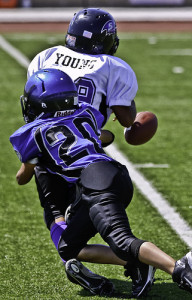Traumatic Brain Injuries and California Sports
Brain injuries and American football have, unfortunately, seemed to go hand in hand in recent years. Despite the popularity of contact sports, commentators have suggested that contact sports may have to be scaled back in the coming years due to the high risk of serious head trauma. Research suggests that even a mild traumatic brain injury (TBI) like a concussion can have life-threatening consequences. Indeed, a number of professional football players have been diagnosed with chronic traumatic encephalopathy (CTE), a dangerous degenerative brain condition caused by multiple concussions, while a number of high school athletes have sustained severe brain injuries on the field.
What’s California doing to prevent serious head injuries? According to a recent article in the Los Angeles Times, Governor Jerry Brown recently signed into law a bill that is designed to protect student athletes from serious TBIs. Specifically, it “prohibits football teams at middle and high schools from holding full-contact practices that exceed 90 minutes a day,” while it also “limits the number of full-contact practices during the season to two per week.” In addition, it prohibits coaches from holding any contact practices at any point during the off-season.
The restrictions in the new law will take effect on January 1, 2015. They’re designed, the article reported, “to help reduce concussions and other serious brain injuries.”
History of the Law and Teen Sports Injuries
How did the law come about? Assemblyman Ken Cooley introduced the bill, AB 2127, emphasizing that its “practice guidelines will reassure parents that their kids can learn football safely through three hours of full-contact practice.” He explained that the prohibitions weren’t intended to prevent teenage athletes from playing football. Rather, he made clear, the new law would “maximize conditioning and skill development while minimizing concussion risk.”
The bill received support from the California Interscholastic Federation (CIF), an organization in charge of high school sports in California. In addition to the new law, the CIF also put a new rule into effect that will begin in schools this fall. The rule prohibits high school coaches in our state from spending more than 18 hours each week on practices. John Aguirre, the commissioner of the Los Angeles City Section and a former football coach, emphasized that “everybody is going to have to educate themselves and transition within the limitations.”
As you might imagine, a number of high school football coaches aren’t very happy about the new law and the CIF rule. According to a coach at Los Angeles Roosevelt High School, football teams “need to have full contact” in the off-season. Without it, he argues, coaches won’t be able to “figure out who can play.”
Are the new prohibitions necessary to prevent head injuries? Do we really need these restrictions when we’re just talking about high school athletes? In short, the answer is yes. Based on data reported by the Centers for Disease Control and Prevention (CDC), about 4 million high schoolers sustain brain injuries every year, and many of those serious injuries occur during practices for popular contact sports like football.
If your child sustained a concussion or other severe brain injury while playing high school sports, it’s very important to talk to an experienced San Diego brain injury attorney. You may be able to seek compensation. Contact us today to learn more about how we can assist you.
Photo Credit: jedIII via Compfight cc
See Related Blog Posts:
Female Athletes, High School Athletes, and Brain Injury Severity
 North County San Diego Injury Lawyers
North County San Diego Injury Lawyers









